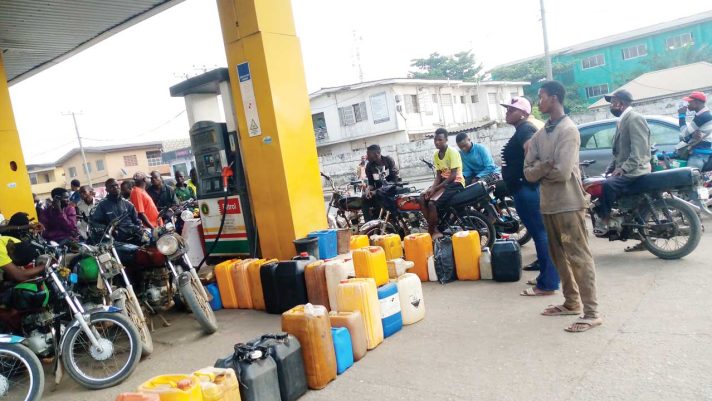NAIRA CRISIS: Filling station attendants, PoS operators make sharp business deals as cash becomes commodity
… High court judge left nearly penniless, stranded in Lagos —Alake of Egbaland
…. Cash crunch hits churches

By Naomisophyblog
FOR the first time since he started operating his provision store in Ikotun, a suburb of Lagos, Mr. Clement Akpia was forced during the week to violate a principle he had held sacred for almost two decades. Until Tuesday when he had to allow a nursing mother in the neighbourhood leave his shop with a tin of baby formula without paying, it had been Akpia’s resolve never to allow any customer buy even a pin from his shop on credit.
To make his stance clear to any would be customer, he had placed the inscription of ‘no credit today, come tomorrow’ in front of his shop. Below the bold inscription are two framed pictures of two businessmen, one looking happy and gay, declaring that he sold in cash while the other looks sad and miserable, proclaiming that he sold on credit.
On Tuesday, however, he had to waive his stance about selling on credit after the nursing mother whose baby was crying for food said that all her efforts to obtain cash from all the automated teller machines in the area had failed and neither online nor mobile app transfer of money could be done from her phone. Moved to pity by the cry of the customer’s baby, Akpia was left with no choice but ask the nursing mother to go home with the baby formula she desired and bring the money as soon as she was able to obtain cash.
Akpia said: “I have had to change my stance about not selling on credit since the crisis provoked by the redesigning of the naira began because people are finding it difficult to obtain cash from the banks and even the POS machines.
“I also discovered that people are finding it difficult to do money transfer probably because there is too much pressure on banks’ mobile apps which millions of people have to use at the same time.
‘For instance, a woman came into my shop and her baby was crying for food. She wanted to buy food for her baby but she could not obtain cash after going round all the ATM machines in the neighbourhood. She tried to do online transfer but that too became impossible.
“After seeing all her efforts and her crying baby, I was left with no choice but to sell baby food to her on credit and ask her to bring the money the following day.”
Few Nigerians had an inkling of the crisis that loomed when the Central Bank of Nigeria (CBN) announced the introduction of redesigned N200, N500 and N1,000 bank notes into the financial system on October 26 last year and gave December 31 as the date the old notes would seize to be legal tender. The alarm raised by concerned Nigerians that the deadline notice was too short had fallen on deaf ears as the CBN Governor Godwin Emefiele insisted that the date was as sacred as Christmas.
Nigerians watched with bated anxiety and the nation was set on edge as the deadline drew close and the automated teller machines were still dispensing the old naira notes. It got to a point that concerned Nigerians had to raise the alarm about the unusual turn of events. But rather than abate, the problem has worsened by the day, forcing people to devise various means and making heavy sacrifice to get cash.
Aisha, a resident of Ota in Ogun State, told one of our correspondents during the week that the minders of an ATM at a branch of Wema Bank at The Bells University where she had gone in search of cash insisted that no one would be allowed to withdraw more than N3,000 which was dispensed in N100 notes.
Another resident of the historical town and health worker who identified himself simply as Segun relayed how he had to approach a filling station attendant for assistance with his POS machine when all his efforts to obtain money from banks’ ATMs yielded no result. To get N20,000, however, he had to pay the filling station attendant N2,000.
Segun said: “We had no food at home and we needed money. After all efforts to obtain money failed, I had to give N2,000 to a petrol attendant to get the needed cash.
“If I had not done so, I would have had a serious crisis to deal with at home. It is not a pleasant experience but that is where we have found ourselves.”
In Lagos, POS operators also had a field day fleecing helpless Nigerians of their hard-earned money as they charged sums ranging between N1,000 and N5,000 as commission.
A GTBank customer who had previously withdrawn N10,000 from one branch and returned to another branch of the bank could not withdraw extra.
Echoing her disappointment, the customer said: “On Wednesday, they were not paying at all. In the morning, they only paid maximum N5,000 to non-bank customers and paid real bank customers maximum N10,000.”
An angry bank customer, who gave his name simply as Fatai, told one of to our correspondents in a chat that it was the pressure they mounted that compelled the banks to start paying them.
“In the last two days or so, they were not paying,” he said.
Also justifying the rather skewed payment arrangement, a security guard in one of the banks said the bank chose that option because there were instances where non-bank customers used the ATM to withdraw as much as N150,000, hence they had to reconfigure the ATMs to dispense fewer notes to non-bank customers and pay the bank customers at least N10,000.
Checks revealed that very few of the banks across the Lagos metropolis were paying their customers.
A middle-aged woman who reportedly came to the bank to withdraw the sum of N100,000 was paid in N5, N10 and N20 denominations. After fuming and puffing for hours, the distraught woman loaded them in a bag and left.
There was also the case of a woman who required urgent medical attention but she could not get money to fund her health emergencies as most of the banks she visited were completely out of cash.
Investigation conducted by our correspondents revealed that many of the banks in the city had reconfigured their ATMs to dispense only N1,000 to other bank customers while the bank’s customers could only make a withdrawal of N10,000 as against the N20,000 limit set by the apex regulatory bank, CBN.
In some cases, some frustrated customers engaged in slugfest as they pummeled themselves in the heat of the cash-strap crisis. Many banks premises were tension-soaked as customers who had been kept under very dehumanising conditions lost their cool.
Filling station attendants, PoS operators make brisk business
While many Nigerians are lamenting the prevailing situation, petrol attendants are conniving with PoS operators in many areas to make brisk business. It is now common sight to see PoS operators hanging around filling stations where they but the cash available to the filling station attendants and sell to their (PoS) customers at exorbitant rates.
Adetoun, a trader who lamented that sales had dropped drastically because would be customers could not obtain the cash they needed had hinted on it when she said: “The situation is so bad that PoS operators in my neighborhood are coming to ask me for cash to do business. It is a dark period in the history of this country. It is the first time I am witnessing this kind of untold hardship. The government must do something about it before things get out of hand.”
One of our correspondents recalled his experience at a filling station in an Ogun community where he made fruitless efforts to transfer money into a bank account the station’s attendant gave to him to transfer money into after he had bought fuel.
After repeated attempts to transfer money into the said account had failed, the filling station attendant directed the reporter to a nearby PoS operator who charged the reporter the sum of N2,000 as commission for the N20,000 he demanded.
Unknown to the reporter that there was a working relationship between the filling attendant and the PoS operator, he stormed out of the PoS operator’s shop and reported the exorbitant commission charged by the PoS operator to the attendant. But rather than sympathise with the reporter, the filling station attendant only smiled and said, “That is what others are paying”.
The attendant then told the reporter that his vehicle would be ‘detained’ at the filling station until he was able to get money to ‘bail’ it. The reporter had to abandon his car at the filling station until the following morning when his app became functional and he transferred money into the attendant’s private account.
But it was a case of different strokes for different folks as some PoS operators have had their operations completely crippled by scarcity of cash.
Olamide Adeoti, a PoS operator in Meiran area of Lagos, shared his plight thus: “I have not been operating for three days now because it has been difficult to get cash from the bank.
A few days ago, I had to approach a resident who sold the sum of N100,000 to me and collected N10,000 as charges. I have asked my office clerk to stay at home until cash is available because I cannot afford to operate at a loss. Customers are running away from paying a huge amount as charges on their withdrawals.”
For Motolani Akorede, another PoS operator in Abule Egba area of Lagos, the song is not different.
“There is no cash for me to spend, not to talk of giving to customers. The cash crisis has opened my eyes to think of other endeavours as succour in times like this in the future.
“I gave up when I visited my bank and I was given tally number 250 on the queue. Still, there was no money to withdraw at the end of the day.”
Cash crunch hits churches
The Nation gathered that many churches are feeling the pains bred by cash scarcity. Some church administrators who spoke with our correspondents said the offerings and collections made in their churches last Sunday were poor.
A church administrator, who spoke on condition of anonymity because he was not authorised to speak on the matter, likened the situation faced by some churches right now to what they faced during the lockdown impelled by the COVID-19 pandemic in 2020.
He said: “The offering dropped last Sunday and we also expect it to drop next Sunday. Majorly, everything is centered on money.
“Those in the informal sector do not get money to do business. The money that ought to circulate has been hijacked, and that is what they are reselling.
“It is like what we experienced during the COVID-19 period. It dropped significantly.”
High court judge left nearly penniless, stranded in Lagos —Alake of Egbaland
Read Also :Naira stockpillers plotting interim government – Tinubu
The Alake and paramount ruler of Egbaland, Oba Adedotun Gbadebo, advised the Central Bank of Nigeria to be conscious of the feelings of Nigerians when embarking on any financial policy, saying the current cash swap policy and the attendant crisis, almost left a High Court Judge penniless and stranded in Lagos a few days ago.
Alake, who warned that any policy that is not people-friendly would not succeed, was reacting to the current challenges Nigerians are grappling with over naira swap. He described the currency swap exercise as the “worst thing” to be thrown at people who were already burdened with the pains of collecting permanent voter card (PVC) and running around for scarce fuel.
The monarch spoke yesterday when he received the team of the Central on the apex bank from Abuja, Lagos and Ogun states.
The team led the branch controller, Ogun State, Alhaji Wahab Lanre Oseni, was at the palace in respect of the ongoing nationwide sensitization programme on the newly redesigned naira notes.
He said an unnamed judge attended a club in Lagos on Tuesday and had no more money left in his pocket. But providence came his way when someone came to the club to make payment across the club’s counter with cash. The judge quickly seized the opportunity, did electronic transfer and collected the cash from the person.
According to the monarch, that fortuitous moment saved the judge.
He said: “We are not too happy about the devaluation of naira, particularly in that last three years that it went haywire that it went for N700/N800 to one dollar. Then the worst thing was this currency exchange you are doing and you insisted on not going to change the date and that the date was fixed.
“We didn’t want the polity to be over heated, because election is coming. We have problem of fuel, problem of having permanent voter card, then you add the currency to it and people could not spend money.
“A high court judge just left here now. He went to a club in Lagos. Somebody paid N8000 at the (club’s) counter. He quickly transferred the N8000 to them and collected the cash. Otherwise, he didn’t have a penny in his pocket,” he said.
Speaking earlier at the Alake’s palace, Oseni said the apex bank was of the strong conviction that the task of sensitising Ogun residents would not be complete without carrying along the traditional institution because of their closeness to the people at the grassroots.
“The traditional institution will always help us because you at the grassroots can help us talk to our people generally and that’s why the exercise can never be complete without visiting the palaces,” Oseni said.
Source:The Nation


















